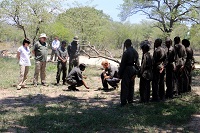Prince Harry visits the Southern African Wildlife College

His Royal Highness Prince Harry visited the Southern African Wildlife College during his recent royal tour of South Africa. Following his visit to the Kruger National Park on 2 December 2015, he met with students at the college’s field ranger training base and graduates of the wildlife area management training programme.
Prince Harry spoke about his love for Africa and his concern for its wildlife. He called the battle against poaching a test for all humanity that we cannot afford to fail.
“There is no pretending that this will be easy,” he said. “But when we win this battle, the victory will belong to those of you on the frontline.
Prince Harry also announced that United for Wildlife will support the college.
United for Wildlife was created by The Royal Foundation of The Duke and Duchess of Cambridge and Prince Harry. The campaign unites the world’s leading wildlife charities to create a global movement for change.
“I am delighted to announce today that United for Wildlife will work with, and fund, the Southern African Wildlife College so that its graduates are equipped with the best techniques and technologies available to protect some of the world’s most endangered species,” said Prince Harry.
The collaboration will provide significant funding to help train wildlife area managers and field rangers protecting Southern Africa’s endangered species. It will also support the Community-Based Natural Resource Management Unit.
“The college has, with the support of various partners including the Jobs Fund, increased its field ranger training capability. This training unit now provides field ranger training and specialist anti-poaching skills training, which is further supported by aerial patrols and ground-to-air patrol training, as well as a new canine anti-poaching training capability.
The college is extremely proud to have been selected as a partner by United for Wildlife in the fight against poaching and the illegal wildlife trade. In addition, the funding provided will support other training initiatives across the region, including the implementation of SMART (Spatial Monitoring and Reporting Tools), a youth access programme and the involvement of local communities via our Community-Based Natural Resource Management programmes,” said the college’s CEO, Theresa Sowry.